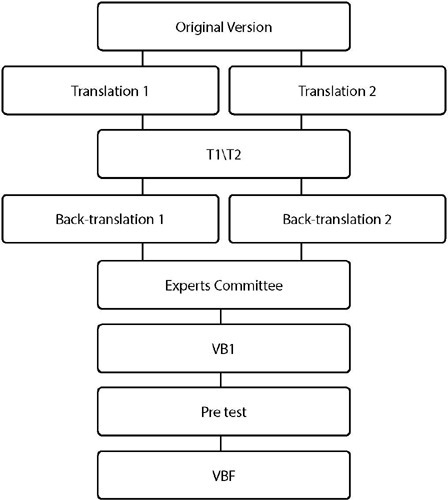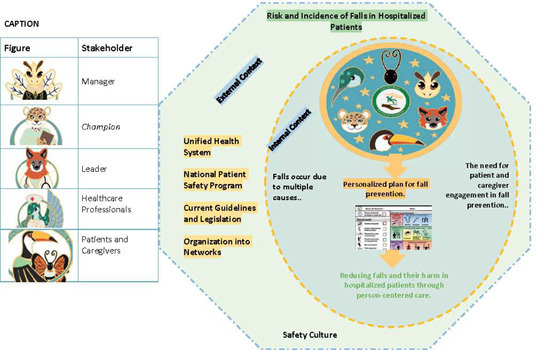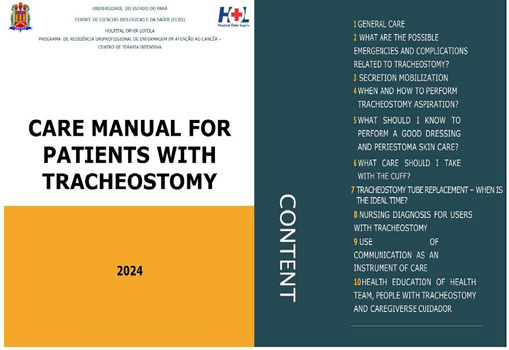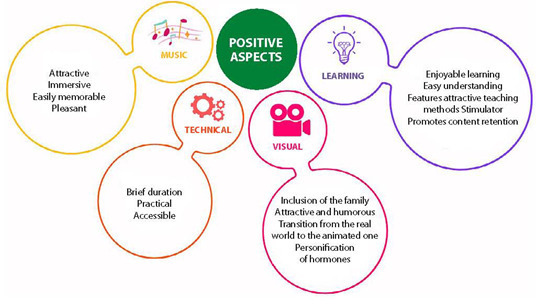-
ORIGINAL ARTICLE10-06-2023
Nursing students’ professional values for reinforcing the professional identity
Revista Brasileira de Enfermagem. 2023;76:e20220338
Abstract
ORIGINAL ARTICLENursing students’ professional values for reinforcing the professional identity
Revista Brasileira de Enfermagem. 2023;76:e20220338
DOI 10.1590/0034-7167-2022-0338
Views0See moreABSTRACT
Objectives:
to understand the nursing students’ professional values in different Brazilian universities and verify a correlation between the “Professional Value” and the sociodemographic variables.
Methods:
quantitative, cross-sectional, and descriptive study conducted through an electronic questionnaire with a Professional Values Scale (NPVS-3). Participants were Nursing students of all semesters from three universities – two in the Southeast region and one in the North region.
Results:
of the 337 participating Nursing students, 282 were female. The Caring dimension presented the highest score (mean=46.61), and Professionalism, the lowest score (mean=34.65). A statistically significant association was detected between the Caring dimension, “university where is attending,” and “gender.”
Conclusions:
the results indicate the Caring dimension as the one containing the most scored professional values since the nurses’ training, and the relation of those values in such dimension is more significant in the female sample.
-
10-06-2023
Pesquisa Translacional em Saúde: para onde vamos?
Revista Brasileira de Enfermagem. 2023;76(5):e760501
Abstract
Pesquisa Translacional em Saúde: para onde vamos?
Revista Brasileira de Enfermagem. 2023;76(5):e760501
DOI 10.1590/0034-7167.2023760501pt
Views0Os contributos das pesquisas científicas são incontestáveis para o avanço da ciência e para a sociedade. Por isso, cada vez mais reflexões acerca dos impactos e da aplicabilidade dos estudos têm permeado o centro das discussões em nível global, sobretudo diante do aumento crescente da produção de conhecimentos. Nesse cenário, a translação da pesquisa (TP) […]See more -
10-06-2023
Translational Health Research: where are we going?
Revista Brasileira de Enfermagem. 2023;76(5):e760501
Abstract
Translational Health Research: where are we going?
Revista Brasileira de Enfermagem. 2023;76(5):e760501
DOI 10.1590/0034-7167.2023760501
Views0The contributions of scientific research are undeniable for the advancement of science and for society. Therefore, more and more reflections on the impacts and applicability of studies have permeated the center of discussions at a global level, especially considering the growing increase in knowledge production. In this scenario, research translation (RT) has a notable importance […]See more -
10-06-2023
Advanced Practice Nursing: “Training” Pillar in Supporting the Proposal in Brazil
Revista Brasileira de Enfermagem. 2023;76(5):e20230118
Abstract
Advanced Practice Nursing: “Training” Pillar in Supporting the Proposal in Brazil
Revista Brasileira de Enfermagem. 2023;76(5):e20230118
DOI 10.1590/0034-7167-2023-0118
Views0See moreABSTRACT
Objectives:
to present the pillars that support what has been called Advanced Practice Nursing and discuss the necessary training for its implementation.
Methods:
elements contained in assessment documents for graduate programs proposals, reports of presentations by international professors in countries and selected scientific publications were gathered to compose the argument.
Results:
practice/competency (adds broad and in-depth knowledge about health processes and scientific evidence, clinical reasoning and clinical skills for therapeutic indications); 3) professional regulation (corresponding legislation and monitoring); and 4) funding (broad training and professional practice policy).
Final Considerations:
the agenda for implementing Advanced Practice Nursing in Brazil involves joining efforts to identify stakeholders for a work to legitimize their importance in the country’s health and education overview.

-
ORIGINAL ARTICLE10-06-2023
Quality of health care in Primary Care: perspective of people with Diabetes Mellitus
Revista Brasileira de Enfermagem. 2023;76(5):e20230008
Abstract
ORIGINAL ARTICLEQuality of health care in Primary Care: perspective of people with Diabetes Mellitus
Revista Brasileira de Enfermagem. 2023;76(5):e20230008
DOI 10.1590/0034-7167-2023-0008
Views0See moreABSTRACT
Objectives:
to identify how people with diabetes assess the care offered by Primary Care teams.
Methods:
a cross-sectional study based on structured interviews with the application of the Patient Assessment of Chronic Illness instrument to people with Type 2 Diabetes Mellitus. Data were submitted to statistical analysis.
Results:
451 individuals participated in the study, more than half aged 60 years or older (64.0%); 63.9% had been diagnosed for more than five years; and 23.9% used insulin. The average score obtained was 2.5, which indicated little involvement in self-care and low support for the care of the chronic condition by the Family Health Strategy team, and was higher among women and people with a partner.
Conclusions:
people with diabetes consider that they do not receive individualized treatment, with dialogue and discussion for setting goals, and that they are not prepared for self-managing their health condition.

-
REVIEW10-06-2023
Nursing theories in the care of stroke patients: a scoping review
Revista Brasileira de Enfermagem. 2023;76(5):e20220791
Abstract
REVIEWNursing theories in the care of stroke patients: a scoping review
Revista Brasileira de Enfermagem. 2023;76(5):e20220791
DOI 10.1590/0034-7167-2022-0791
Views0See moreABSTRACT
Objectives:
to map and synthesize nursing theories and conceptual frameworks that have been applied in the practice of nursing care for stroke patients in hospital settings.
Methods:
a scoping review was conducted in October 2022 using the MEDLINE (accessed via PubMed), CINAHL, Scielo, and Web of Science databases, following The Joanna Briggs Institute guidelines.
Results:
nine studies incorporated six nursing theories and three conceptual frameworks, which were employed to enhance stroke patient care. The objective of these theories and conceptual frameworks was to facilitate the identification of the patient’s psychobiological, psychosocial, and psychospiritual needs, elucidate the nurse’s role and expand their perspective on rehabilitation, and acknowledge the survivor’s process of transition.
Final Considerations:
this mapping exercise identified major nursing theories, middle-range theories, and conceptual frameworks applied to the care of stroke patients.

-
ORIGINAL ARTICLE10-06-2023
Learning strategies of undergraduate nursing students during the COVID-19 pandemic
Revista Brasileira de Enfermagem. 2023;76(5):e20220764
Abstract
ORIGINAL ARTICLELearning strategies of undergraduate nursing students during the COVID-19 pandemic
Revista Brasileira de Enfermagem. 2023;76(5):e20220764
DOI 10.1590/0034-7167-2022-0764
Views0See moreABSTRACT
Objectives:
to analyze the learning strategies used by nursing students from a public university, in remote teaching, during the COVID-19 pandemic.
Methods:
a cross-sectional study developed with nursing students who attended remote teaching classes. The sample was obtained by convenience and data were collected online, with 112 participants. Student and Mann-Whitney tests were performed for data analysis.
Results:
the most frequently used learning strategies were self-regulatory and cognitive. There was moderate use of interpersonal help-seeking and emotional control strategies. Male students, with a private study environment and good internet connection, used emotional control strategies more frequently.
Conclusions:
self-regulatory and cognitive learning strategies, appropriate for higher education, were frequently used by nursing students, which is an important tool for adapting these students to the university context.
-
ORIGINAL ARTICLE10-06-2023
Nursing, history, and orthopedics in manuals (1875-1928)
Revista Brasileira de Enfermagem. 2023;76(5):e20220567
Abstract
ORIGINAL ARTICLENursing, history, and orthopedics in manuals (1875-1928)
Revista Brasileira de Enfermagem. 2023;76(5):e20220567
DOI 10.1590/0034-7167-2022-0567
Views0See moreABSTRACT
Objectives:
to discuss the content of manuals, with emphasis on orthopedics, in support of the development of nursing care culture.
Methods:
cultural-historical method articulated with document analysis technique. The sources were nursing manuals – Portuguese, French, English, and Spanish – from 1875 to 1928.
Results:
this study pointed to 12 works – 6 authored by physicians, 2 by nurses, 3 institutional, and 1 by a Sister of Charity – that presented, in a transversal way, the professionalization process initiated in Europe. The manuals addressed first aid care and immobilization methods, from the simplest, such as improvised splints, to the application of plaster casts.
Conclusions:
the nurses’ work, even in a limited capacity, showed that they were able to observe warning signs so that doctors could act, with some exceptions.

-
06-01-2015
Elderly families of South of Brazil in the Health Strategy
Revista Brasileira de Enfermagem. 2015;68(3):406-413
Abstract
Elderly families of South of Brazil in the Health Strategy
Revista Brasileira de Enfermagem. 2015;68(3):406-413
DOI 10.1590/0034-7167.2015680305i
Views0See moreABSTRACT
Objective:
to characterize families and health status of the elderly in the Family Health Strategy and to verify the association of family composition with sociodemographic characteristics and health of the elderly.
Method:
population-based study with 215 families and 266 elderly, linked to the Family Health Strategy from a city of Rio Grande do Sul state.
Results:
there was predominance of nuclear family composition, considered as the main source of informal support, families of female elderly (62.6%) and cardiovascular complication. The nuclear structure was signifi cantly associated with female gender (PR = 0.77; p = 0.025) and smoking (PR = 1.35; p = 0.009).
Conclusion:
the results reinforce the need to maintain a network of formal and informal support to the elderly and their families to preserve the independence or to postpone the decline in functional capacity.
-
06-01-2015
From real to ideal – the health (un)care of long-lived elders
Revista Brasileira de Enfermagem. 2015;68(3):398-405
Abstract
From real to ideal – the health (un)care of long-lived elders
Revista Brasileira de Enfermagem. 2015;68(3):398-405
DOI 10.1590/0034-7167.2015680304i
Views0See moreABSTRACT
Objective:
to analyze similarities and dissimilarities in the meanings assigned to health care by long-lived elders and nursing professionals in a healthcare setting.
Method:
ethnographic qualitative research, based on the Spradley-McCurdy method and the interpretive anthropology of Geertz and Kleinman. The sample consisted of 20 key informants. Data were collected through participatory observation and ethnographic interviews from March to October 2013 and analyzed in domains, taxonomies and cultural themes.
Results:
Six domains and cultural taxonomies emerged and revealed reasons, attributes, and resources in providing care in relationship to long-lived elders and nursing professionals; fi nally, the following cultural theme emerged: the real to the ideal – the health (un)care of long-lived elders.
Conclusion:
The study showed the distance between the desired and actual health care provided to aged people in the scenario studied.
-
06-01-2015
Rescuing the pleasure of playing of child with cancer in a hospital setting
Revista Brasileira de Enfermagem. 2015;68(3):391-397
Abstract
Rescuing the pleasure of playing of child with cancer in a hospital setting
Revista Brasileira de Enfermagem. 2015;68(3):391-397
DOI 10.1590/0034-7167.2015680303i
Views0See moreABSTRACT
Objective:
to dimension spaces and people that act on playing of children with cancer in outpatient treatment.
Method:
qualitative research developed with the creative sensitive method. A total of twenty two family members of seven children with cancer in outpatient treatment at a public hospital in Rio de Janeiro participated of this research. Data were generated in the family members’ homes, from September 2011 to May 2012.
Results:
after the diagnosis of childhood cancer, there was a change of scene and in the people who interact and play with children. Hospital has a central place for it, since children discover the pleasure of playing in this setting.
Conclusion:
the health care professional, especially nurses, who work on hospital care needs, should develop the ability of facilitate playing and therefore, enable care that promotes childhood development.
-
06-01-2015
Child Health Surveillance: nurses perspective
Revista Brasileira de Enfermagem. 2015;68(3):384-390
Abstract
Child Health Surveillance: nurses perspective
Revista Brasileira de Enfermagem. 2015;68(3):384-390
DOI 10.1590/0034-7167.2015680302i
Views0See moreABSTRACT
Objective:
to analyze conceptions of nurses on child health surveillance in family health units.
Method:
a qualitative study with thematic analysis of the data, based on the paradigm of Health Surveillance. Interviews were conducted with 13 nurses in a countryside city in the state of Sao Paulo.
Results:
nurses conceived child health surveillance as an active monitoring, which should be comprehensive, identifying risks/vulnerabilities, through multidisciplinary and intersectoral actions that are dependent on maternal involvement. We found partial development of these assumptions in practice, due to diffi culties such as lack of maternal involvement in the proposed actions, lack of time for discussion and adoption of measures in the units and disarticulation between levels and sectors of the city.
Conclusion:
a greater political and technical investment is needed to ensure the adoption of this model in different sectors and levels of care of the city.
-
06-01-2015
The many sides of Research Integrity: For Integrity in Nursing!
Revista Brasileira de Enfermagem. 2015;68(3):375-377
Abstract
The many sides of Research Integrity: For Integrity in Nursing!
Revista Brasileira de Enfermagem. 2015;68(3):375-377
DOI 10.1590/0034-7167.2015680301i
Views1We recently had the opportunity to participate in the 4th World Conference on Research Integrity in Rio de Janeiro. For us researchers, professors, authors, reviewers and scientific editors of nursing periodicals, the event was a watershed: From this point forward, we must step up our game and catch up with other areas that already discuss […]See more -
06-01-2015
As diversas faces da Integridade em Pesquisa: por uma Enfermagem íntegra!
Revista Brasileira de Enfermagem. 2015;68(3):375-377
Abstract
As diversas faces da Integridade em Pesquisa: por uma Enfermagem íntegra!
Revista Brasileira de Enfermagem. 2015;68(3):375-377
DOI 10.1590/0034-7167.2015680301i
Views0Recentemente, tivemos oportunidade de participar da 4ª Conferência Mundial de Integridade em Pesquisa, no Rio de Janeiro. Para nós, pesquisadores, docentes, autores, pareceristas e editores científicos de periódicos de Enfermagem foi um evento divisor de águas: de ora em diante precisamos apertar o passo para alcançar as áreas que já têm as questões de Integridade […]See more -
01-01-2015
Professional Master’s Degree: potential contribution to Advanced Practice Nursing
Revista Brasileira de Enfermagem. 2015;68(6):1186-1189
Abstract
Professional Master’s Degree: potential contribution to Advanced Practice Nursing
Revista Brasileira de Enfermagem. 2015;68(6):1186-1189
DOI 10.1590/0034-7167.2015680626i
Views0See moreABSTRACT
A reflection articleabout the contribution of Master’s Degree Programs in Advanced Practice Nursing and the Universal Health Coverage and the Universal Health Access, topicsthat have been discussed by the Pan American Health Organization, and which the Brazilian Nursingrequires not just appropriate, but further studyto reflect in order to define directions for our profession.
-
01-01-2015
Concept of family insufficiency in the aged: critical literature analysis
Revista Brasileira de Enfermagem. 2015;68(6):1176-1185
Abstract
Concept of family insufficiency in the aged: critical literature analysis
Revista Brasileira de Enfermagem. 2015;68(6):1176-1185
DOI 10.1590/0034-7167.2015680625i
Views0See moreABSTRACT
Objective:
to identify the attributes of the “family insufficiency” concept of the aged in the literature.
Method:
critical literature analysis.
Results:
family insufficiency is characterized as a complex process of psychosocial interaction, founded mainly on low social support of the aged and impaired family ties. Its antecedents are found in contemporary transformations within the family system, intergenerational conflicts, impaired family relationships and social vulnerability of the family. The consequences of family insufficiency include social vulnerability of the aged, decline of psychological and functional health, lower quality of life and unsuccessful aging. An original theoretical proposal was elaborated for the concept of family insufficiency in the elderly, with the identification of its attributes, antecedents and consequences.
Conclusion:
the findings of this study constitute a theoretical advancement in the Family Insufficiency Syndrome in elderly people and provide data for future field research in developing the concept.
-
06-14-2024
Duração e qualidade do sono da equipe de enfermagem brasileira que trabalha em turnos
Revista Brasileira de Enfermagem. 2024;77(2):e20230167
Abstract
Duração e qualidade do sono da equipe de enfermagem brasileira que trabalha em turnos
Revista Brasileira de Enfermagem. 2024;77(2):e20230167
DOI 10.1590/0034-7167-2023-0167
Views0See moreRESUMEN
Objetivo:
analizar la duración y calidad del sueño en profesionales de enfermería que trabajan por turnos.
Método:
investigación analítica, transversal, realizada entre septiembre de 2017 y abril de 2018, en un hospital público del sur de Brasil, con el equipo de enfermería. Se utilizó el cuestionario sociolaboral y de síntomas de salud, la Escala de Somnolencia de Epworth y el Índice de Calidad del Sueño de Pittsburgh. Los datos se presentan como estadística descriptiva e inferencial, análisis bivariado y regresión logística binaria.
Resultados:
participaron 308 profesionales de enfermería, con predominio de sueño prolongado, ausencia de somnolencia y mala calidad del sueño. La duración corta del sueño (<6 h) se asoció con turnos de día y mala calidad del sueño. La calidad del sueño se asoció con la presencia de somnolencia diurna excesiva y con el trabajo diurno.
Conclusión:
los turnos de trabajo, el insomnio y la cefalea fueron los principales factores relacionados con la falta de sueño de los profesionales de enfermería. Los resultados pueden justificar el desarrollo de investigaciones de intervención para la salud de los trabajadores.
-
ORIGINAL ARTICLE06-14-2024
Sleep duration and quality of Brazilian nursing staff who work in shifts
Revista Brasileira de Enfermagem. 2024;77(2):e20230167
Abstract
ORIGINAL ARTICLESleep duration and quality of Brazilian nursing staff who work in shifts
Revista Brasileira de Enfermagem. 2024;77(2):e20230167
DOI 10.1590/0034-7167-2023-0167
Views0See moreABSTRACT
Objective:
to analyze sleep duration and sleep quality in nursing professionals who work in shifts.
Method:
this is a cross-sectional, analytical research, carried out between September 2017 and April 2018, at a public hospital in southern Brazil, with the nursing team. A socio-occupational and health symptoms questionnaire, the Epworth Sleepiness Scale, and the Pittsburgh Sleep Quality Index were used. Data are presented as descriptive and inferential statistics, bivariate analysis, and binary logistic regression.
Results:
participants were 308 nursing professionals with a predominance of long-term sleep, absence of drowsiness, and poor sleep quality. Short-term sleep (<6h) was associated with day shift and poor sleep quality. Sleep quality was associated with presence excessive daytime sleepiness and work day shift.
Conclusion:
work shift, insomnia and headache were the main factors related short-term sleep for nursing professionals. The results may justify the development of intervention research for workers’ health.
-
ORIGINAL ARTICLE06-14-2024
Translation and Cross-Cultural Adaptation of the LYMPH-ICF Instrument for Lymphedema into Portuguese/Brazil
Revista Brasileira de Enfermagem. 2024;77(2):e20230137
Abstract
ORIGINAL ARTICLETranslation and Cross-Cultural Adaptation of the LYMPH-ICF Instrument for Lymphedema into Portuguese/Brazil
Revista Brasileira de Enfermagem. 2024;77(2):e20230137
DOI 10.1590/0034-7167-2023-0137
Views0See moreABSTRACT
Objective:
The aim of this study is to cross-culturally adapt the Lymphoedema Functioning, Disability and Health Questionnaire Lymphoedema (LYMPH-ICF) instrument into Brazilian Portuguese and conduct a pilot application (n = 10), without psychometric pretensions.
Method:
Methodological research was conducted, following the steps of translation, synthesis, back-translation, and evaluation by the expert committee. Two translators, two back-translators, and twelve professionals participated in the expert committee. A pretest was carried out with 10 patients with secondary lymphedema due to breast cancer. The degree of agreement was determined by the content validity coefficient.
Results:
It was necessary to modify 8 out of the 29 questions comprising the questionnaire, which exhibited idiomatic disagreement. However, despite these changes, there were no indications of impairments, as content reliability was achieved through a validity coefficient of 0.90.
Final Considerations:
The instrument was successfully translated and cross-culturally adapted for Brazil with a high level of agreement.

-
ORIGINAL ARTICLE05-27-2024
Fall Tailoring Interventions for Patient Safety Brazil Program: an evaluability study in a teaching hospital
Revista Brasileira de Enfermagem. 2024;77(2):e20230348
Abstract
ORIGINAL ARTICLEFall Tailoring Interventions for Patient Safety Brazil Program: an evaluability study in a teaching hospital
Revista Brasileira de Enfermagem. 2024;77(2):e20230348
DOI 10.1590/0034-7167-2023-0348
Views0See moreABSTRACT
Objectives:
to present the theoretical model, logic model, and the analysis and judgment matrix of the Fall TIPS Brazil Program.
Methods:
a qualitative, participatory research approach, in the form of an evaluability study, encompassing the phases (1) problem analysis; (2) program design, development, and adaptation to the Brazilian context; (3) program dissemination. Data were collected through document analysis and workshops.
Results:
through document analysis, workshops with stakeholders from the participating institution, and validation with key informants, it was possible to identify the program’s objectives, expected outcomes, and the target audience. This allowed the construction of theoretical and logic models and, through evaluative questions, the identification of indicators for the evaluation of the Fall TIPS Brazil Program.
Final Considerations:
this study has provided insights into the Fall TIPS program, the topic of hospital fall prevention, and the proposed models and indicators can be employed in the implementation and future evaluative processes of the program.

-
ORIGINAL ARTICLE05-27-2024
Nursing care protocol for critical users with tracheostomy under mechanical ventilation
Revista Brasileira de Enfermagem. 2024;77(2):e20230337
Abstract
ORIGINAL ARTICLENursing care protocol for critical users with tracheostomy under mechanical ventilation
Revista Brasileira de Enfermagem. 2024;77(2):e20230337
DOI 10.1590/0034-7167-2023-0337
Views0See moreABSTRACT
Objectives:
to develop and assess a nursing care protocol for critically ill users with tracheostomy under mechanical ventilation.
Methods:
a methodological study, developed through two phases, guided by the 5W2H management tool: I) target audience characterization and II) technology development.
Results:
thirty-four nursing professionals participated in this study, who presented educational demands in relation to care for critical users with tracheostomy, with an emphasis on standardizing care through a protocol and carrying out continuing education.
Final Considerations:
the creation and validity of new technologies aimed at this purpose enhanced the participation of nursing professionals and their empowerment in the health institution’s microsectoral actions and in macrosectoral actions, highlighting the need for public policies that guarantee the conduct of a line of care for users with tracheostomy.

-
ORIGINAL ARTICLE05-27-2024
Assessment of educational technology in lactation physiology by health students
Revista Brasileira de Enfermagem. 2024;77(2):e20230252
Abstract
ORIGINAL ARTICLEAssessment of educational technology in lactation physiology by health students
Revista Brasileira de Enfermagem. 2024;77(2):e20230252
DOI 10.1590/0034-7167-2023-0252
Views0See moreABSTRACT
Objectives:
to assess the suitability, facilitators, and barriers of using a video clip for teaching lactation physiology to health students.
Methods:
a cross-sectional study was conducted with online data collection at a higher education institution, using the Assistive Technology Assessment Instrument and open-ended questions. The sample consisted of 88 students.
Results:
the video clip was deemed suitable in all attributes. Facilitators identified included attractiveness, musicality, and ease of access. Barriers noted were the music’s speed and the necessity for prior knowledge. The video clip achieved adequate scores for interactivity (1.71), purpose (1.77), relevance (1.64), and clarity (1.77). The overall average of the attributes was 1.72.
Conclusions:
the video clip can serve as an effective learning strategy to enhance hybrid education, potentially contributing to the promotion and support of breastfeeding. However, some barriers underscore the importance of prior knowledge for a complete understanding of the content.

-
ORIGINAL ARTICLE05-27-2024
Technology for nursing care in a Maternal Intensive Care Unit: a methodological study
Revista Brasileira de Enfermagem. 2024;77(2):e20230202
Abstract
ORIGINAL ARTICLETechnology for nursing care in a Maternal Intensive Care Unit: a methodological study
Revista Brasileira de Enfermagem. 2024;77(2):e20230202
DOI 10.1590/0034-7167-2023-0202
Views0See moreABSTRACT
Objectives:
to develop and validate a nursing care plan in a Maternal Intensive Care Unit.
Methods:
a methodological study, developed in stages: integrative review; Nursing History construction; care plan restructuring; appearance and content validity by judges.
Results:
the history was organized into sections: Identification; Basic Human Needs; Physical Examination; and Assessment of Basic Human Needs. A care plan was restructured with 34 diagnoses, organized according to basic human needs. A satisfactory level of appearance validity of the history and care plan was obtained (Concordance Index varying between 86.3 and 100 for both instruments), and content validity with average indexes of 90.8 and 92.8, respectively. Thirty-four diagnoses, their interventions and nursing actions were consolidated.
Conclusions:
the instruments were considered relevant and pertinent in terms of appearance and content, and their use in the institution under study as well as in other similar services may be recommended.
-
05-13-2024
Metodologia qualitativa: considerações e singularidades sobre a implementação de intervenções centradas na pessoa
Revista Brasileira de Enfermagem. 2024;77(3):e770301
Abstract
Metodologia qualitativa: considerações e singularidades sobre a implementação de intervenções centradas na pessoa
Revista Brasileira de Enfermagem. 2024;77(3):e770301
DOI 10.1590/0034-7167.2024770301pt
Views0A investigação qualitativa em saúde permite a compreensão aprofundada de como a pessoa experiencia as diferentes transições de saúde, a relação com os profissionais de saúde e a passagem pelos diferentes ambientes de prática clínica. Concomitantemente, tem o potencial de suportar a tomada de decisão clínica dos profissionais e de empoderar o cidadão na sua […]See more
Search
Search in:
Nuvem de Tags
Adolescente (85) Atenção Primária à Saúde (239) COVID-19 (91) Criança (91) Cuidados de Enfermagem (269) Educação em Enfermagem (151) Educação em Saúde (139) Enfermagem (930) Enfermagem Pediátrica (86) Estudantes de Enfermagem (77) Estudos de Validação (131) Família (87) Idoso (208) Promoção da Saúde (99) Qualidade de Vida (104) Saúde do Trabalhador (86) Saúde Mental (145) Saúde Pública (82) Segurança do Paciente (150) Tecnologia Educacional (100)



